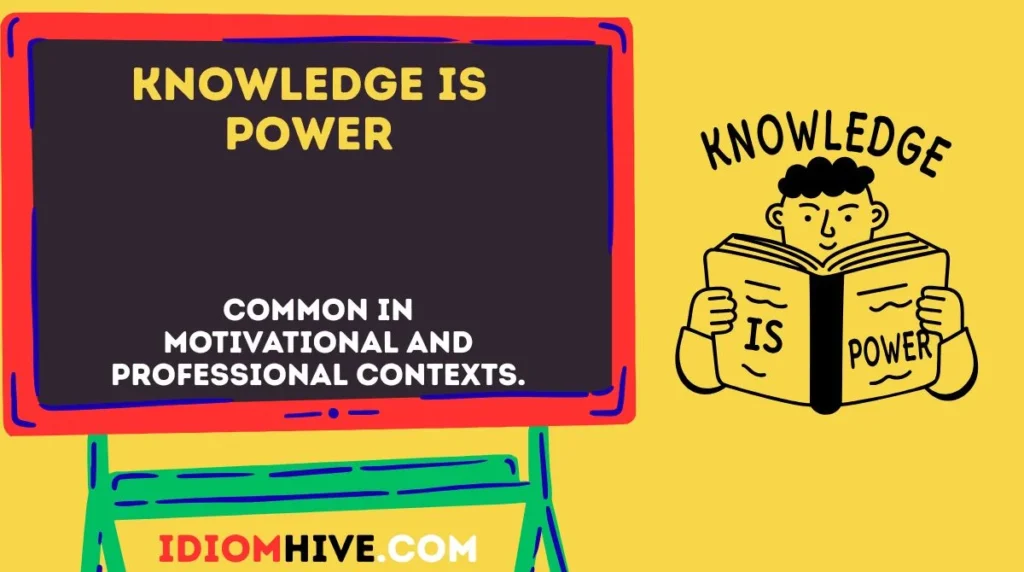Knowledge is one of the most powerful tools a person can have. It guides our decisions, shapes our future, and enriches our conversations.
But did you know that English has hundreds of idioms that describe knowledge, wisdom, and learning? Idioms are expressions where the meaning goes beyond the literal words. They make communication more colorful, memorable, and natural.
Using idioms for knowledge not only helps you sound fluent in English but also allows you to express complex ideas in simple, creative ways. Whether you are a student, a teacher, a professional,
or just someone who loves learning, idioms about knowledge are perfect for making your language richer and more engaging. In this article, we’ll explore over 46 idioms related to knowledge, organized into different themes, with meanings, examples, and usage notes to help you master them.
Did You Know?
The word “knowledge” comes from the Old English word cnāwan, which means “to know or perceive.” Interestingly, many idioms about knowledge often connect with light, vision, and books, symbolizing wisdom throughout history.
Idioms About General Knowledge and Wisdom
Knowledge is power

Meaning: Knowledge gives people the ability to influence or succeed.
Example: “She believes that knowledge is power, so she studies every day.”
Similar Idiom: “Information is key.”
Note: Common in motivational and professional contexts.
An old head on young shoulders
Meaning: A young person who is unusually wise.
Example: “My niece gives the best advice—an old head on young shoulders.”
Similar Idiom: “Wise beyond their years.”
Note: Informal praise, often used for children or teenagers.
To know the ropes
Meaning: To understand how something works.
Example: “After a few weeks, I finally knew the ropes of my new job.”
Similar Idiom: “To get the hang of it.”
Note: Common in workplace settings.
Street smart
Meaning: Having practical knowledge gained through experience.
Example: “He may not be book-smart, but he’s definitely street smart.”
Similar Idiom: “Practical wisdom.”
Note: Informal, often used in contrast to academic intelligence.
Book smart
Meaning: Having academic or theoretical knowledge.
Example: “She’s very book smart but doesn’t have much real-world experience.”
Similar Idiom: “Well-read.”
Note: Often contrasted with street smart.
To know something inside out
Meaning: To understand something completely.
Example: “She knows the company’s policies inside out.”
Similar Idiom: “Know like the back of your hand.”
Note: Useful in professional and academic contexts.
Bright spark
Meaning: A clever or intelligent person.
Example: “That bright spark in class always has the answer.”
Similar Idiom: “Sharp as a tack.”
Note: Informal, sometimes sarcastic.
Sharp as a tack
Meaning: Extremely intelligent or quick-witted.
Example: “Even at 80, my grandmother is sharp as a tack.”
Similar Idiom: “Quick on the uptake.”
Note: Positive compliment, often in daily conversation.
To have your wits about you
Meaning: To stay alert and think clearly.
Example: “You need to have your wits about you in a busy market.”
Similar Idiom: “Keep your eyes open.”
Note: Common in informal advice.
In the know
Meaning: Having special knowledge about something.
Example: “Only managers are in the know about the new project.”
Similar Idiom: “Behind the scenes.”
Note: Professional and casual usage.
Idioms About Learning and Curiosity
You live and learn
Meaning: You gain knowledge from everyday experiences.
Example: “I lost my way, but you live and learn.”
Similar Idiom: “Every day’s a school day.”
Note: Informal, reflective phrase.
To learn the hard way
Meaning: To learn through difficult experience.
Example: “He learned the hard way not to skip deadlines.”
Similar Idiom: “Trial and error.”
Note: Informal, often used in personal stories.
Food for thought
Meaning: Something that makes you think carefully.
Example: “Her lecture gave me a lot of food for thought.”
Similar Idiom: “Something to chew on.”
Note: Common in academic and reflective settings.
Learn by heart
Meaning: To memorize completely.
Example: “He learned the poem by heart.”
Similar Idiom: “Commit to memory.”
Note: Common in school or study situations.
Burning the midnight oil
Meaning: Studying or working late into the night.
Example: “She’s been burning the midnight oil to prepare for exams.”
Similar Idiom: “Pulling an all-nighter.”
Note: Common in student and professional life.
To learn the ropes
Meaning: To become familiar with something new.
Example: “The intern quickly learned the ropes of the office routine.”
Similar Idiom: “To get the hang of it.”
Note: Common workplace idiom.
Curiosity killed the cat
Meaning: Too much curiosity can lead to trouble.
Example: “Don’t ask too many questions—curiosity killed the cat.”
Similar Idiom: “Let sleeping dogs lie.”
Note: Informal, often used as a warning.
A know-it-all
Meaning: A person who acts as if they know everything.
Example: “Nobody likes a know-it-all in meetings.”
Similar Idiom: “Smart aleck.”
Note: Informal, often negative.
Wise as an owl
Meaning: Very wise.
Example: “My grandfather is as wise as an owl.”
Similar Idiom: “Full of wisdom.”
Note: Commonly used in storytelling or admiration.
Idioms About Ignorance and Lack of Knowledge
In the dark
Meaning: Not knowing about something.
Example: “We were kept in the dark about the changes.”
Similar Idiom: “Out of the loop.”
Note: Common in workplace conversations.
None the wiser
Meaning: Still not understanding something.
Example: “After his explanation, I was none the wiser.”
Similar Idiom: “Clueless.”
Note: Informal, used when confused.
To turn a blind eye
Meaning: To ignore something deliberately.
Example: “The teacher turned a blind eye to the chatter.”
Similar Idiom: “Look the other way.”
Note: Used both formally and informally.
To be clueless
Meaning: To have no idea.
Example: “I’m clueless about how to fix this computer.”
Similar Idiom: “At a loss.”
Note: Informal, daily life usage.
Pig ignorant

Meaning: Extremely ignorant or rude.
Example: “He’s pig ignorant about cultural traditions.”
Similar Idiom: “Totally clueless.”
Note: Informal, often harsh.
To not know the first thing
Meaning: Having no basic knowledge.
Example: “I don’t know the first thing about cooking.”
Similar Idiom: “Completely new to it.”
Note: Daily informal speech.
Out of the loop
Meaning: Not informed about something.
Example: “I’ve been out of the loop during my vacation.”
Similar Idiom: “In the dark.”
Note: Professional and casual.
To not have a clue
Meaning: Totally unaware.
Example: “I don’t have a clue how this machine works.”
Similar Idiom: “Clueless.”
Note: Informal.
Idioms About Sharing and Using Knowledge
Pass on knowledge
Meaning: To teach others what you know.
Example: “Teachers pass on knowledge to their students.”
Similar Idiom: “Hand down wisdom.”
Note: Common in education.
Drop some knowledge
Meaning: To share information or insight.
Example: “The professor dropped some knowledge during his lecture.”
Similar Idiom: “Spread wisdom.”
Note: Informal, modern usage.
To spread the word
Meaning: To share information widely.
Example: “Please spread the word about the charity event.”
Similar Idiom: “Pass it along.”
Note: Informal, daily conversations.
To shed light on something
Meaning: To explain or clarify.
Example: “Her book sheds light on ancient cultures.”
Similar Idiom: “Clear up.”
Note: Academic and professional.
To teach someone a lesson
Meaning: To help someone learn through experience.
Example: “That mistake taught me a lesson.”
Similar Idiom: “Learn the hard way.”
Note: Common in both informal and formal settings.
To wise up
Meaning: To become more aware or smarter.
Example: “He finally wised up about his spending habits.”
Similar Idiom: “Catch on.”
Note: Informal usage.
To put two and two together
Meaning: To figure something out.
Example: “I put two and two together and realized they were dating.”
Similar Idiom: “Connect the dots.”
Note: Informal and daily speech.
To know better
Meaning: To be too wise to do something foolish.
Example: “She should know better than to trust him.”
Similar Idiom: “Learned her lesson.”
Note: Informal advice.
How to Use These Idioms in Daily Life
Idioms about knowledge can enrich your English in many areas:
- Speaking: Use them in conversations to sound natural. For example, “I was kept in the dark” is more engaging than “I didn’t know.”
- Writing: They make essays, articles, and stories more expressive. Instead of “She studied late,” say “She was burning the midnight oil.”
- Professional use: Idioms like “in the know” or “shed light on” are often used in meetings and reports to sound polished and clear.
Common Mistakes Learners Make With Idioms
- Wrong context:
❌ “He burned the midnight oil at the party.”
✔ “He burned the midnight oil to finish his project.” - Too literal:
❌ “I learned the poem in my heart.”
✔ “I learned the poem by heart.” - Mixing idioms:
❌ “He’s sharp as a rope.”
✔ “He’s sharp as a tack.”
FAQs
1. What are idioms for knowledge?
They are expressions that describe wisdom, intelligence, ignorance, or learning in creative ways.
2. Are idioms for knowledge used in professional English?
Yes. Phrases like “in the know” and “shed light on” are common in offices, reports, and meetings.
3. Can idioms make me sound fluent?
Absolutely. Native speakers use idioms daily, so using them correctly makes your English sound natural.
4. Which idioms are best for students?
“Burning the midnight oil,” “learn by heart,” and “you live and learn” are very common for students.
5. How can I remember idioms easily?
Connect them to real situations in your life and practice using them in sentences.
Conclusion
Knowledge is more than just facts—it’s the wisdom to use information wisely. Idioms for knowledge capture this beautifully, helping us describe learning, wisdom, and even ignorance in lively ways.
From “burning the midnight oil” to “sharp as a tack,” these phrases make conversations more colorful and engaging. The next time you want to express intelligence, confusion, or the joy of learning, try using one of these idioms.
They’ll not only improve your English but also add charm and depth to the way you speak and write.










